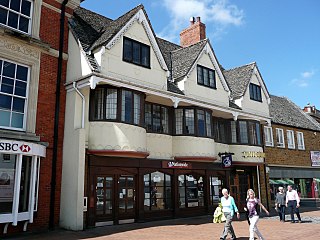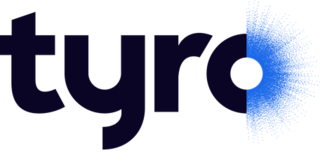
A building society is a financial institution owned by its members as a mutual organization, which offers banking and related financial services, especially savings and mortgage lending. They exist in the United Kingdom, Australia and New Zealand, and formerly in Ireland and several Commonwealth countries, including South Africa as mutual banks. They are similar to credit unions, but rather than promoting thrift and offering unsecured and business loans, the purpose of a building society is to provide home mortgages to members. Borrowers and depositors are society members, setting policy and appointing directors on a one-member, one-vote basis. Building societies often provide other retail banking services, such as current accounts, credit cards and personal loans. The term "building society" first arose in the 19th century in Great Britain from cooperative savings groups.
Australian Securities Exchange Ltd (ASX) is an Australian public company that operates Australia's primary securities exchange, the Australian Securities Exchange. The ASX was formed on 1 April 1987, through incorporation under legislation of the Australian Parliament as an amalgamation of the six state securities exchanges, and merged with the Sydney Futures Exchange in 2006.

National Australia Bank is one of the four largest financial institutions in Australia in terms of market capitalisation, earnings and customers. NAB was ranked the world's 21st-largest bank measured by market capitalisation and 52nd-largest bank in the world as measured by total assets in 2019.
The Australian Prudential Regulation Authority (APRA) is a statutory authority of the Australian Government and the prudential regulator of the Australian financial services industry. APRA was established on 1 July 1998 in response to the recommendations of the Wallis Inquiry. APRA's authority and scope is determined pursuant to the Australian Prudential Regulation Authority Act, 1998 (Cth).

The NRMA is an Australian organisation offering roadside assistance, advocacy for motorists and road-users, motoring advice, car servicing, International Driving Permits, travel and other services in New South Wales and the Australian Capital Territory. It is a member-owned mutual company limited by guarantee. It was formed in 1920.

AMP is a financial services company in Australia and New Zealand providing superannuation and investment products, financial advice, and banking products including home loans and savings accounts. Its headquarters is in Sydney, Australia.
Banking in Australia is dominated by four major banks: Commonwealth Bank, Westpac, Australia & New Zealand Banking Group and National Australia Bank. There are several smaller banks with a presence throughout the country which includes Bendigo and Adelaide Bank, Suncorp Bank, and a large number of other financial institutions, such as credit unions, building societies and mutual banks, which provide limited banking-type services and are described as authorised deposit-taking institutions (ADIs). Many large foreign banks have a presence, but few have a retail banking presence. The central bank is the Reserve Bank of Australia (RBA). The Australian government’s Financial Claims Scheme guarantees deposits up to $250,000 per account-holder per ADI in the event of the ADI failing.
David Tweed is an Australian businessman who conducts a business of offering to buy securities at either below market value, or at a price that is above market value but via installments. Paying in installments can disadvantage the seller due to the time value of money. Tweed's business practices are controversial in some quarters and his success has attracted criticism from the media and the Australian Securities & Investments Commission. The Federal Government introduced legislation to regulate Tweed's activities.
MyState Limited is an Australian financial group, headquartered in Hobart, Tasmania. It formed in 2009 following the merger of the Tasmanian Perpetual Trustees and MyState Financial. In 2011 it further purchased the Queensland-based Rock Building Society for $68.3 million AUD. In October 2014, its largest section, MyState Financial received authorisation from the Australian Prudential Regulation Authority to rename itself to MyState Bank.
Joel Macdonald is a businessman and former Australian rules footballer.

Australian Ethical is an ethical investment management company, listed on the ASX, and based in Sydney, Australia

MLC was an Australian business that provides investments, insurance and superannuation solutions to corporate, institutional, and retail customers. Due to divestments in the early 21st century, there are now two businesses, with no ownership links, that both use "MLC" in their branding:

Tyro Payments Limited (Tyro) is an Australian financial institution (neobank) specialising in merchant credit, debit and EFTPOS acquiring.

nib Group is an Australian health care fund. It was established in 1952 to provide health insurance for workers at the BHP Newcastle Steelworks, and has since grown into a national and international operation. As of 2017, nib held an 8.3% share of the Australian private health cover market.
HotCopper is an Australian stock market online chat forum that allows its users to discuss financial topics. As of 2015, HotCopper was in the top 170 websites in Australia and was the 5th most popular financial services site in Australia, according to Alexa rankings. In June 2022, the site ranked third in it category, as the 193rd most popular site in Australia, with six million annual visits.
Appen Limited is a publicly traded data company listed on the Australian Securities Exchange (ASX) under the code APX.
Platinum Asset Management is an Australian asset management company. It has been publicly traded on the Australian Securities Exchange since 2007. It is a constituent member of both the S&P/ASX 200 and S&P/ASX 300 indexes. In 2015, it was ranked as the largest hedge fund group in Australia as well as the second largest in Asia-Pacific.

Cromwell Property Group is a commercial real estate investment and management company with operations in Australia, New Zealand and Europe. The Group is in the ASX 200 list. At December 2020, Cromwell had a market capitalisation of $A2.3 billion, a direct property investment portfolio in Australia valued at $A3 billion and total assets under management of $A11.6 billion across Australia, New Zealand and Europe.

Stake is an Australian financial services company headquartered in Sydney, Australia. It was founded in 2017 by Matt Leibowitz, Dan Silver and Jon Abitz. Stake predominately offers low-cost brokerage services to retail investors in Australia, New Zealand, Brazil and the United Kingdom.
ASIC v GetSwift Ltd is a 2023 decision of the Federal Court of Australia brought by the Australian Securities and Investment Commission (ASIC) against technology company GetSwift Ltd which resulted in the largest ever penalty awarded for corporate misconduct and resulted in reforms to listing rules on the Australian Securities Exchange (ASX).











